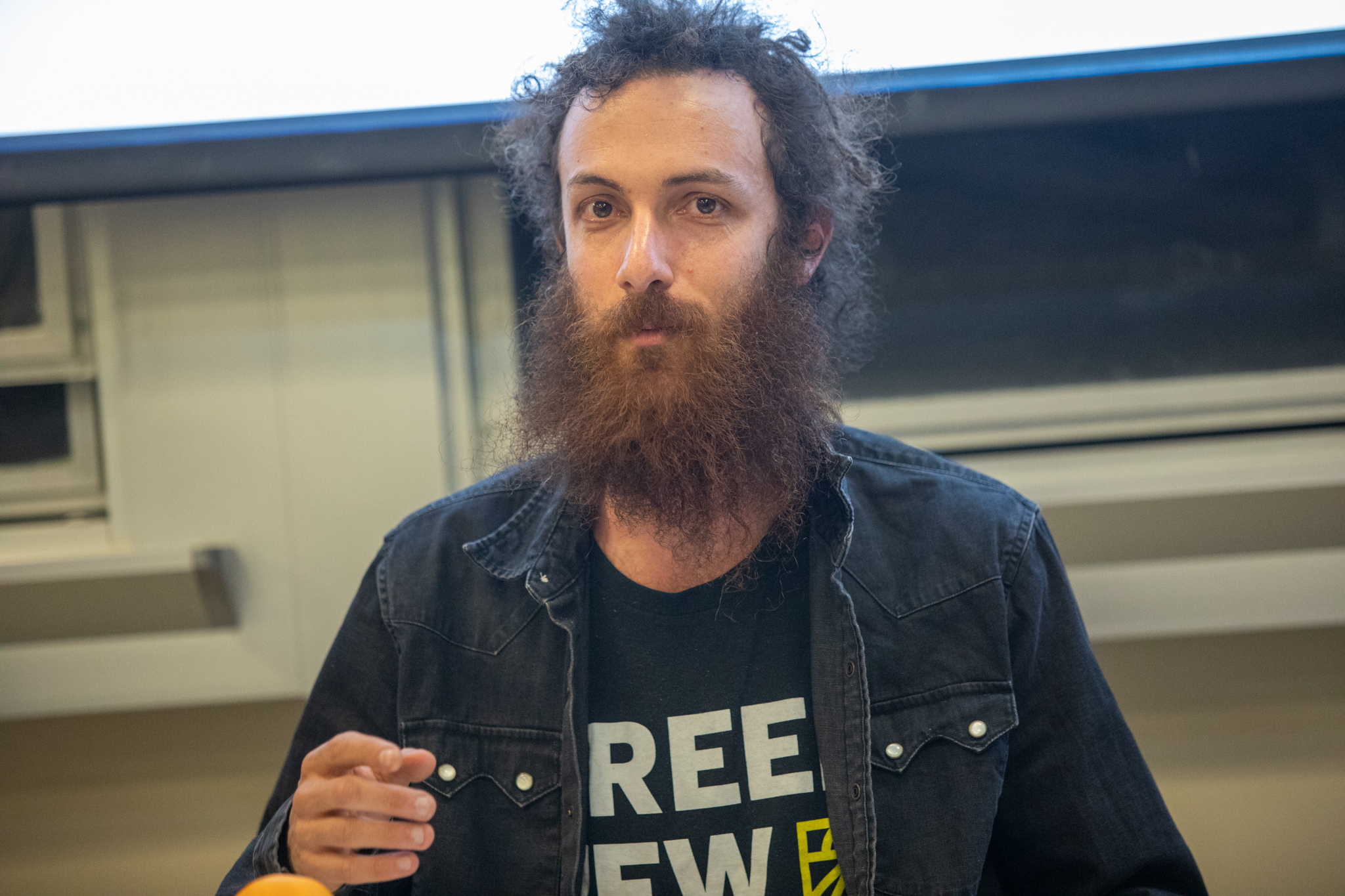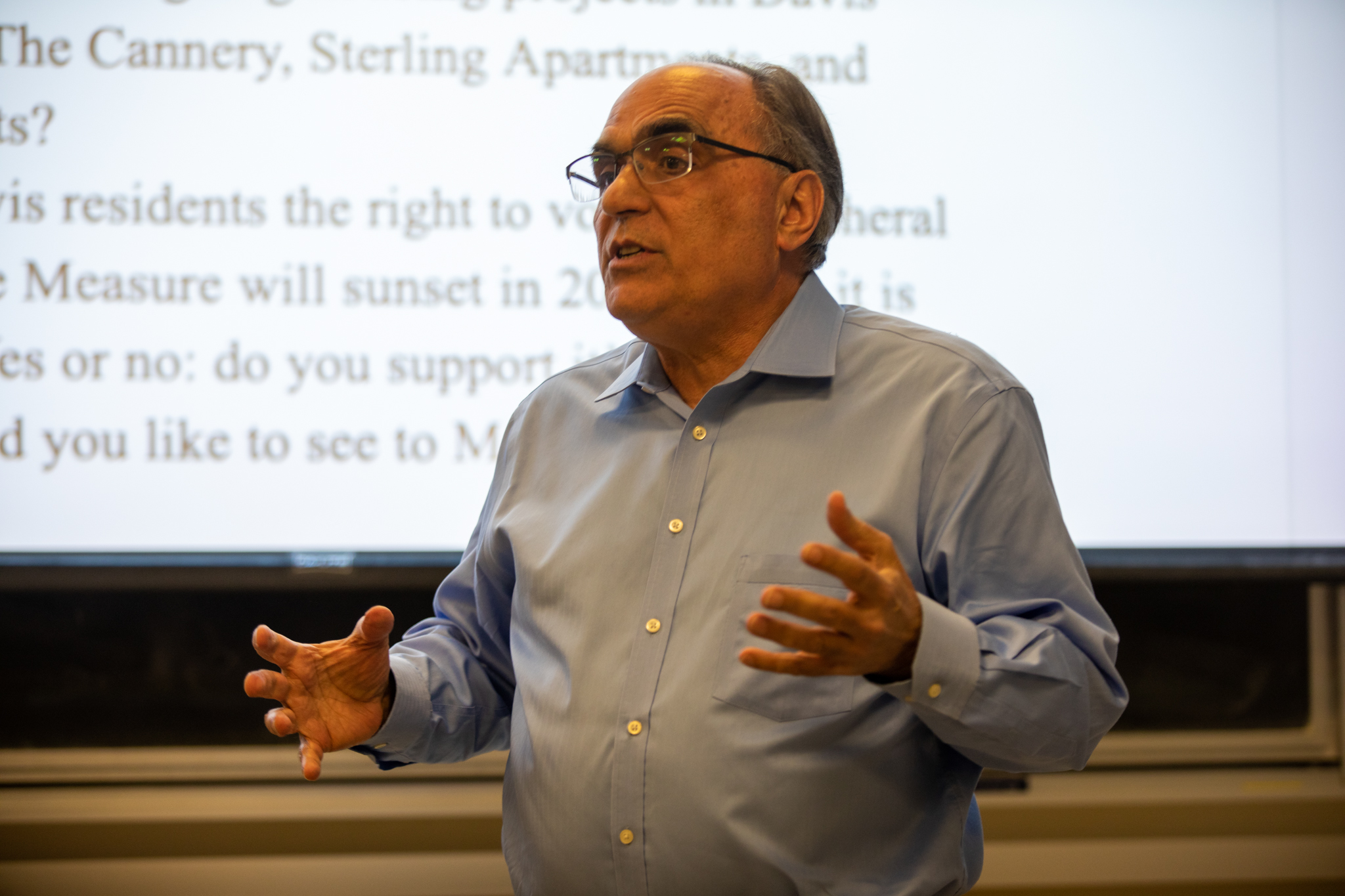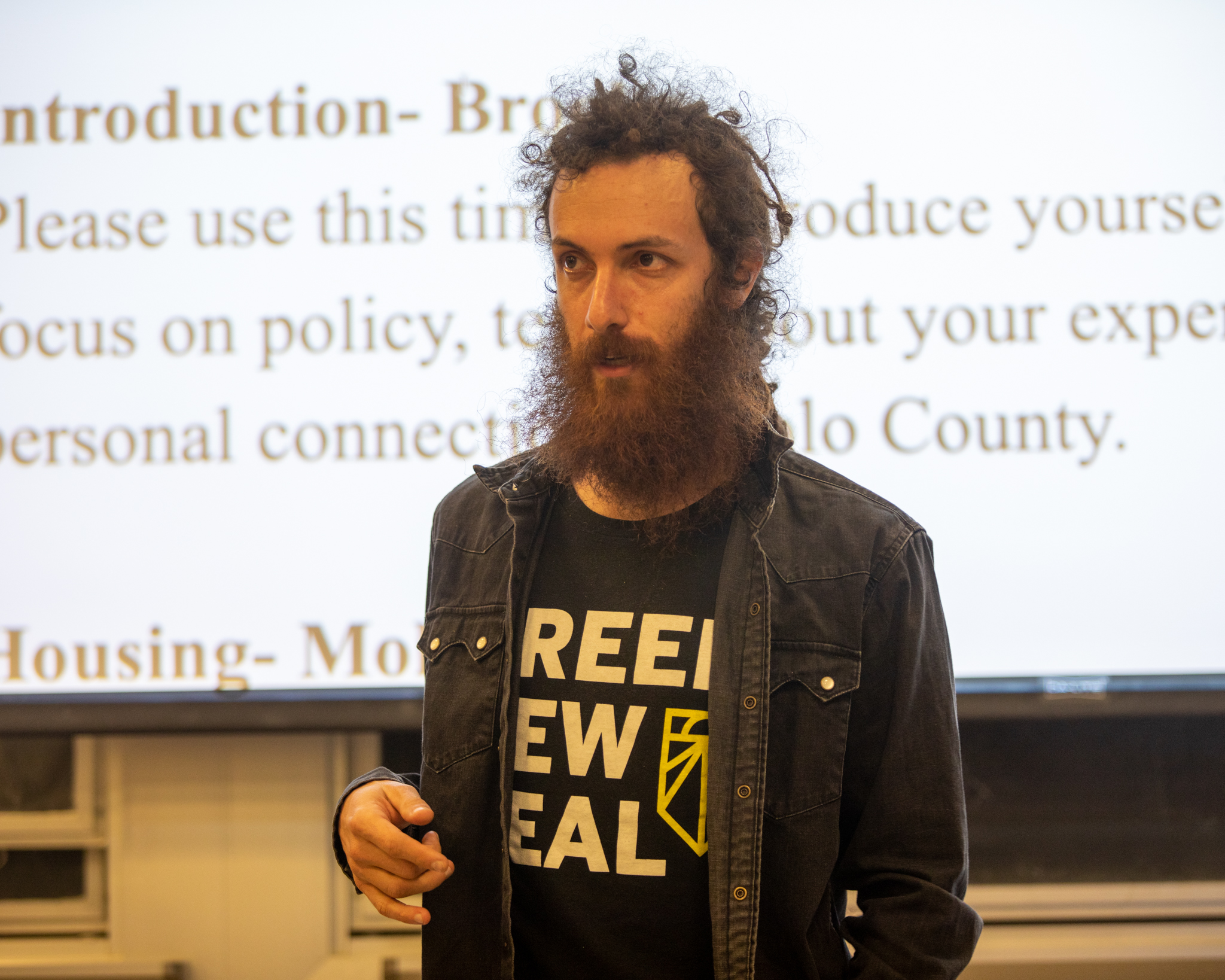

It was a late candidates forum beginning well into the evening on Tuesday night on the UC Davis campus, but the three candidates for the Fourth District Supervisor race, just three weeks prior to Election Day in this truncated primary season offered students a glimpse at the candidates.
“Everyone in this room knows that we need more housing,” David Abramson said. “Probably needed it maybe 10, 20 years ago.
“Our vacancy rate is still less than one percent,” he said. “We all know what the problem is here. I’m a renter, and I pay 50 percent of my income for rent every month just to live in the town I grew up in.”
Mr. Abramson said, “I know what we need here, we need affordable housing and lately the housing has been focused on luxury housing.”

Linda Deos said, “I think housing is a right and should not be seen as a privilege.” To address affordable housing needs, she said, “We are going to have to look at building small, we’re going to have to look at multi-units. Because the future is not necessarily going to be everybody in a ranch-style home or single-family home.”
She talked about the need for incentives to build smaller homes “when luxury homes are a lot more profitable” for developers.
For the county, “I’d like to explore that we can do in some of our unincorporated towns.”

Jim Provenza said, “I think it’s really important that we focus on housing for students as well as all the other groups that need housing in Davis.”
He noted his work on the MOU with the university where the city, the county and the university “got together, we formed what’s called a two by two by two, but we all negotiated a memorandum of understanding with the university to build housing for 100 percent of the new enrollment at UC Davis.”
He said that when the university grows, “that puts more and more pressure on the city of Davis market. The university has not kept pace with other universities – they should be doing at least half or more of student housing on campus.”
The candidates were asked if they supported projects like Nishi 2.0, Cannery, Sterling, and Lincoln40.

Linda Deos said, “Yes, I did support them all.” She said she had some concerns with Sterling “because of its location and there was already a building there… But once it came through I thought we needed more student housing.”
She said she supported Cannery, but “some other things could have been done there. I’m kind of disappointed with the luxury homes that went in there and the marketing to the Bay Area for the marketing of that community – I’m not sure how that helped Davis.”
On Lincoln40 she called it “an interesting concept” and she’s interested in “how it will work here.
“Once we get through all of the lawsuits and the thing gets built, that will be good,” she said. “The same with Nishi. We’re now at Nishi 2.0 as opposed to 1.0 and we have to get through these lawsuits.”

Jim Provenza said, “The county doesn’t take positions on specific projects other than we support what the city of Davis is doing on housing.” He said, “I would have preferred to see something a little different on Sterling, but we’re supportive of the city’s efforts to build more housing.”
He said, “What the county can do is partner with the city on those projects that occur outside the current limits but within the sphere of influence.”
He noted they can also partner on specific needs housing.

David Abamson said “We need to look at the question – what kind of development do we want.” He called Nishi 2.0 a “luxury development,” Cannery a “luxury sprawl development,” Sterling a “luxury development,” and Lincoln40 a “gentrification project on Olive Drive.
“Yes, we should be approving housing projects but let’s talk about what type of housing we want instead of – its not a simple yes or no to me,” he said. “We need infill development. We need affordable development.”
The candidates were asked about whether they support the renewal of Measure R and what if any changes they would like to see.

Jim Provenza said, “I do support the renewal of Measure R. It gives people the right to vote and I would never challenge anything that gives people the right to vote.”
He added, “What’s changed in Davis is that people are willing to vote for good projects. They approved Nishi. They approved the housing in West Davis.”
He noted that, even without Measure R, “[t]he residents can put a measure on the ballot very easily and there’s going to be a vote anyway.”

David Abramson said, “I support Measure R as well. I think we need infill development. It’s the 21st century and we’ve done a lot of expansion – it doesn’t sit right with me. Ecologically speaking, I think we need transit-oriented development. Measure R is good… People deserve to have the right to vote on the projects they want.”

Linda Deos said, “Democracy is important, we need to have the right to vote on all the issues. We also need representation in the democracy where we elect people who will take the time to read the issue, delve into it, because you don’t have the time.”
She said, “The measure is so ingrained into Davis right now, it wouldn’t be right to take that away.” She added, though, “I want to make sure we educate voters about some of the consequences of having a vote. We have kept this town very privileged, we’ve kept it very white. That’s a consequence of having this right… And I think we need to recognize that.”

On the issue of public safety, they were asked how to best serve local law enforcement and what improvements would they make.
Linda Deos responded that she supported a few years ago Dean Johansson for the 2018 district attorney race and that she is now supported by him for this election.
She noted that she works with a lot of people who are incarcerated, and “they were incarcerated not because they committed a crime, but because they couldn’t make bail.” She said, “I would like to look at what more we can do with the elimination of cash bail.” She said, “It’s such a burden for folks who don’t have money.”

Jim Provenza said, “(As a county) we have been trying to get people with mental illness and substance abuse out of the criminal justice system.” He said, “We set up a day reporting system as an alternative to incarceration.”
He explained they go there during the day, they are not incarcerated and don’t spend the night in jail, and they get programs – “whatever their current needs are, we serve them.”

David Abramson said, “We all deserve to feel safe at night when we go to sleep. We all need to feel secure in our communities.”
Noting Natalie Corona’s death, he said, “There’s real dangers out there and our community should be protected from that.” That said, “I’m not super pro-police and we need to be patrolling every street – we need to figure out how healing can happen and how we can address the root causes of a violent society.” He said, “We are going to be running around putting out fires until we address the root issues.”
The follow up was the treatment of people of color by police and how to hold law enforcement accountable for their actions.
David Abramson said that these incidents “didn’t start with Picnic Day 5, it’s been going on for a very long time.” He noted that the history of policing starting with slave patrols – “we are dealing with a deeply racist history.” He said, “Not in Davis, but you look at police departments throughout the country and there’s white supremacist gangs – there’s really troubling stuff that needs to be rooted out.”

Linda Deos: “I think we need actual oversight and accountability. Not just our police and our sheriffs, but higher up.” She said, “The cops out there make arrests, but it’s what happens beyond that. That’s where we need to be looking at – where is the bias, where is that training happening with those folks.“ She noted that there was a bill that proposed oversight by the county sheriffs – she believes we need more oversight.

Jim Provenza: “Our jurisdiction really is the jail, juvenile and the sheriff. We don’t have jurisdiction over the Davis police. But we can work on partnerships.” He said, “A lot of working with the police is training – implicit bias training.” He added, “You can have bias without knowing it.” Implicit bias training “makes you aware of it.”
He also called for oversight of law enforcement.
He noted, “The Davis police have done a good job of learning from mistakes. The Picnic Day incident resulted in a lot of changes to their policy, they’ve been working with community members on those changes.”
He also agree with the need for oversight on the sheriff.
—David M. Greenwald reporting


They all support Measure R.
Such a pity.
Too bad we don’t have the option, “None of the Above” (Nevada used to, not sure if currently).
However, I am coming around to the idea (espoused by Ms Deos) of needing a change in representation… fresh perspectives… different views and approaches… a new way of looking at things…
Probably going to vote for…
Abramson.
So true RG.
And what’s with supporting infill but criticizing everything built / being-built? You don’t build things affordable unless they are subsidized, and if they are subsidized, that just moves the UN-affordible to the next level up — to the working poor — oh, subsidize them, too, you say — well that moves it up another notch, while we all pay higher taxes and billions are skimmed off by government and developers — not a good scheme but exactly where this state is headed, chasing its tail into the abyss.
Agree that it seemed strange that you would support projects but criticize them – it’s like you expect to get the best of both worlds when the reality is that you might get the worst of each.
“Agree that it seemed strange that you would support projects but criticize them.”
Sorry guys, but this just seems a little silly to me. I have supported a number of projects and criticized them for what I saw to be specific flaws. On occasion, I have even seen changes made on the basis of criticisms such as my own. Agreeing that more housing is needed is a far cry from promoting any specific project.
Cash bail and lack of mental health treatment are not law enforcement issues, they are part of the larger criminal justice realm. Local law enforcement is continuously blamed for both, with critics not realizing that local police are just as victimized as the subjects and with no alternative except arrest at 3 am on a weekend.
“Implicit Bias Training” long been a part of the law enforcement training regimen in California dating back to the early 60’s. It’s been expanded ever since and found in every peace officer training curriculum. Name another public service, including elective office, that compares to this type of specialized training commonplace in California policing.
The same with oversight and accountability. No public service or profession has anything close to the institutionalized system of monitoring, review, documentation and periodic publishing. Every official police action taken is recorded and stored somewhere. All such activity is gathered and available to the law enforcement supervisory system. If somebody wanted to know when and where a particular patrol officer took a break for lunch on July 17th, 1982, it could be located.
Overall, good points, Phil…
But almost all agencies have a “Records Retention Policy”… they either don’t have to, and/or actively destroy old records… have no clue what the Davis retention policy is for the documents you mention.
Kinda’ scary, in some ways, keeping a record of, “when and where a particular patrol officer took a break for lunch on July 17th, 1982″… in 2020… except for something like a murder, ‘statute of limitations’ would seem to apply…
Um, no, we already have the right to vote. It’s that now we have the “right” to vote on children, the poor, puppy and old people campaigns for housing development.
Nishi II, not Nishi I, which was far superior. And West Davis project sucks. So, no, they also are willing to vote for projects that suck.
One way to look at it – when you bottle things up for too long – people will be forced to approve anything.
Another way to look at it – what you think sucked, others don’t agree.
A third way – it’s odd that you oppose Measure R and then turn around and complain that the projects suck. You want to be picky but you want to deny the best tool for pickiness.
If only. What actually happens is similar to the CA initiative process — Company A funds a campaign using popular CA buzzwords like ‘green’ and ‘sustainable’ and ‘puppies’ and ‘children’. The initiative passes overwhelmingly voted in by the sheeple of CA, and the initiative as written can only use Company A as the contractor.
Similar to how you get single-family homes built on peripheral land by saying it’s ‘for seniors’ and ‘affordable housing’.
Baaaaaaaah!
“Similar to how you get single-family homes built on peripheral land by saying it’s ‘for seniors’ and ‘affordable housing’.”
Once. Previously that strategy failed.
Who is taking it away in this scenario?
Educate the voters? About what consequences of having a vote exactly? Like being brainwashed by stupid puppy campaigns because your fellow voting mass is stupid?
Who is the “we” in this scenario? And to paraphrase one of my sister’s friends who came to UC Davis in the mid-1960’s at a time when he was one of seven black people on campus, who visited recently, “The biggest change I see is the whole town is filled with Asian girls”.
So let me get this straight . . . the consequence of having Measure R is that “we” have kept Davis “very white”. Despite the fact my sister’s black friend from the almost-all-white UC Davis 1960’s sees a town full of Asian girls. Is it possible Measure R has actually empowered the “privileged” “we” to increase the population of Asians in Davis? My God, what have “we” done?!!!
I was on campus recently and I was surprised and delighted to see it was much more diverse and reflective of the demographics of California.
As for the right to vote because of Measure R, its simply not true that it provides the right to vote for many of the people who pay the rents. International students, post docs, researchers and professors who are not citizens don’t get to vote in Measure R elections. That is a large group of rent payers whose interests might be better served through the representative form of government known as the City Council than under the direct democracy of Measure R from which they are disenfranchised.
Measure R is direct democracy but only for those who can vote.
And I have near zero respect, for those who “can” (eligible) and don’t vote…